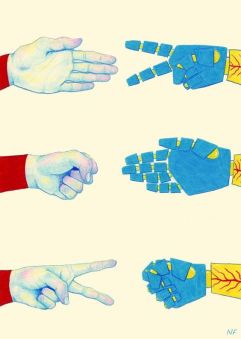Why is everyone so scared that artificial intelligence will take over the world? We’re the ones creating it, after all, so then we shouldn’t have to worry about AI world domination…right?
We’re far off from developing machines with common sense and free will, yet an increasing number of scientists believes we will create computers more intelligent than humans. (Newsflash: we already have.) Hundreds of engineers and scientists have signed an open letter (you can sign too, if you so do choose) written by the Future of Life Institute expressing concern that artificial intelligence may lead to the end of mankind, calling it the “biggest existential threat there is”.
But is artificial intelligence a credible threat?
 With Donald Trump entering office next month, global warming remaining unaddressed, and turmoil ensuing in multiple nations around the globe, should we really be calling these nonexistent robots an “existential threat”? Historically, human actions tend to have unpredictable consequences; after all, it’s impossible to imagine each outcome our choices have on the future. But this AI problem seems like something we can manage. We’re asking such detailed questions so far in advance; currently, the technology we’re discussing does not even exist, and most likely won’t for the remainder of the century.
With Donald Trump entering office next month, global warming remaining unaddressed, and turmoil ensuing in multiple nations around the globe, should we really be calling these nonexistent robots an “existential threat”? Historically, human actions tend to have unpredictable consequences; after all, it’s impossible to imagine each outcome our choices have on the future. But this AI problem seems like something we can manage. We’re asking such detailed questions so far in advance; currently, the technology we’re discussing does not even exist, and most likely won’t for the remainder of the century.
The largest threat AI can have over us is who is in control of it. If artificial intelligence lies in the hands of the wealthy and higher ups, then there is a need for concern, as it could be used for individualized nefarious purposes. It seems the AI argument boils down to three types of consequences:
- Unintended: developers engineer AI that can either be hacked, or can modify itself internally to the point where it is able to evolve on it’s own
- Unintelligible: we create machinery that we don’t understand, and it begins to design itself, sort of Frankenstein’s monster-esque
- Intended, but awful: the most likely in my opinion, this would be AI created by large corporations or wealthy individuals to fulfill needs for the few instead of the many
For now, the AI-doomsday argument is a bit premature. But it is important to decide why we’re building this technology, as well as what purpose it will serve, before we proceed with development.
“Artificial Intelligence is not a Man versus Machine saga; it’s in fact, Man with Machine synergy.” -Sudipto Ghosh
 We haven’t seen a star or supernova from interstellar space–were always looking through the lens of our own solar system. Starshot isn’t a new idea, either; it was previously proposed by Bill Nye, although there wasn’t enough funding or materials to lift the idea off the ground.
We haven’t seen a star or supernova from interstellar space–were always looking through the lens of our own solar system. Starshot isn’t a new idea, either; it was previously proposed by Bill Nye, although there wasn’t enough funding or materials to lift the idea off the ground.